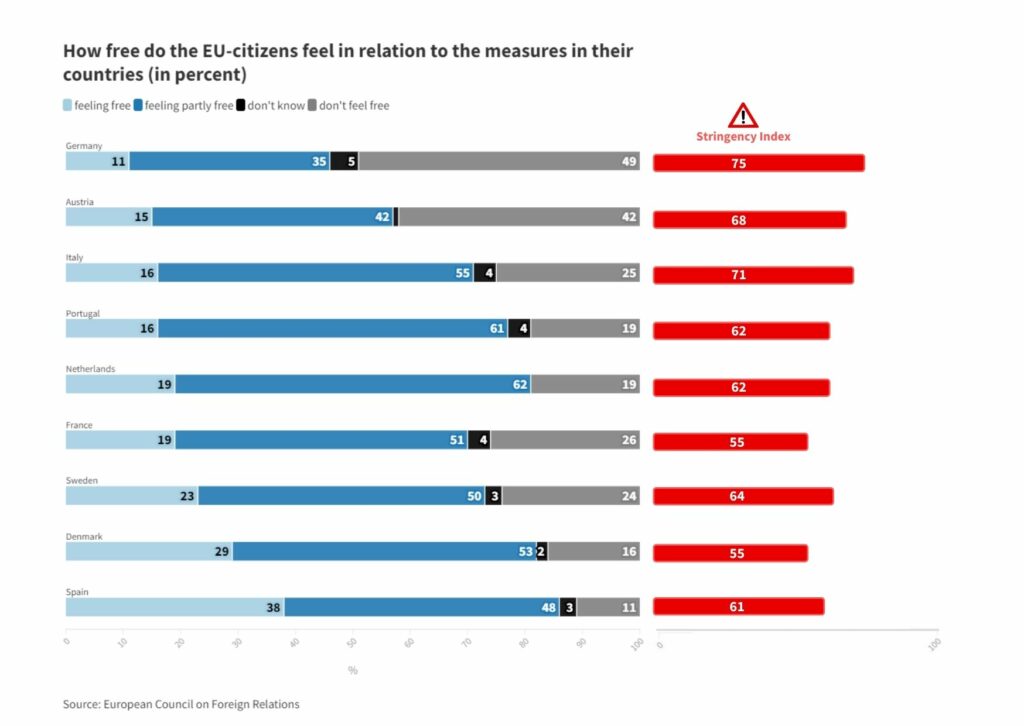On September 7th 2021, Alice Weidel, member of the German parliament and part of the AfD, a right-winged populist party, claimed that only 11% of German citizens feel free in their everyday lives. She stated that the disoriented and excessive corona policy of the German federal government has played a considerable role in this. We rate this claim as mostly true.
At a public debate on the federal election Alice Weidel described the situation in Germany as a wall full of corona measures while other neighboring countries are back to normal. According to the politican this explains that only 11% of the citizens feel free in their everyday lives. Since Weidel does not give a source or comparative figures, this statement should be checked. According to a study by the European Council on Foreign Relations, it is true that only 11% feel free in their everyday life. However, one must mention, 35% feel partly free and 5% don’t know. One shouldn’t leave the 35% out of consideration, it only leads to a distorted perception. The remaining 49% don’t feel free at all.
Why we shouldn’t trust only one number
To correctly interpret these numbers, it is important to take a look at the recent trends: How much has the feeling changed compared to the 2019 survey? The study shows that there has been a decline of the feeling of freedom in all European countries, not only in Germany. In Germany it has decreased from 68% to 11%. But in Austria, for example, 78% of respondents felt free in 2019. In 2021 it was only 15%. Portugal fell from 66% to 16% and the Netherlands from 79% to 19%. Therefore, Germany doesn’t have such an extreme decline on its own, which the graphic illustrates again.
Another important point which Alice Weidel doesn’t mention is that although Germany comes last when the question is “how free do you feel?”, in other countries comparatively more people blame the government for the Covid-19 crisis including the lack of freedom. In Germany only 36% blame institutions and the government. The others say the individuals are to blame – or nobody at all. However, in Spain 57% say its the government’s fault. In Poland even 58%. Compared to other countries, more Germans trust the government and the associated Covid-19 measures. In Germany 65% were trustful, 15% were “the accusers” and 21% “the suspicious”. Weidel interprets the low percentage of the feeling of freedom as very negative. However, since many Germans trust the state and can understand the measures, they would not necessarily decide against measures and more freedom, insofar as they are understandable. Among those impacted by the illness, 40% in Germany believe the restrictions were about right. 20% think the restrictions were too strict and 40% think they were not even strict enough.
So, the 11%, which Alice Weidel refers to are true. But she leaves out relevant numbers and facts that don’t support her thesis.
Germans feel more restricted by corona measures
Weidel’s statement that there are significantly stronger measures in other neighboring countries should be checked too. What is particularly interesting here is the citizens’ sense of freedom in relation to the respective measures in a country. Oxford University, under the direction of the Blavatnik School of Government, has developed a scale that shows the personal measures in a country. Using this method they developed the Stringency Index. The Stringency Index is for comparative purposes only and should not be interpreted as an assessment of the appropriateness or effectiveness of any country’s response. In order to determine to what extent certain measures have influenced the citizens’ feeling of freedom, we used the Covidtracker to determine the Stringency Index between late May and early June, the time the survey was conducted by the European Council on Foreign Relations. It has been shown that at the time of the survey, Germany had the strongest corona measures with a Stringency Index of 75. The Stringency Index of other EU countries is not far from it: Italy has a Stringency Index of 71 and Austria of 68. Although the Stringency Index of Italy is only slightly below that of Germany, 16% of the people feel free, 55% partially free, 4% don’t know and 25% don’t feel free. Italy is an exception, but it shows that the Italians feel comparatively free even though they are subject to similar measures as Germans.

The Stringency Index shows: Germany reacts to many corona cases with significantly stricter measures than other neighboring countries. Weidel’s statement that some neighboring countries have significantly weaker measures is true. Furthermore, the Germans also feel much more restricted and less free than other countries with similar measures.
Conclusion
The investigation shows that Weidel’s statement should not be categorized as completely true. Weidel omits figures from the study by the European Council on Foreign Relations and thus manipulates the perception of her listeners. She only mentioned certain facts to support her opinion.There is also another country with similarly strong measures, where residents feel freer. It has been shown that the feeling of freedom fell in every country during the pandemic. Notably, in comparison to neighbouring countries, Germans don’t blame the government for the general covid crisis, with the majority trusting the motivations of the government in respect to the lockdown restrictions.
RESEARCH | ARTICLE © Christina Menner & Judith Hartmann, Stuttgart Media University, Germany
Leave your comments, thoughts and suggestions in the box below. Take note: your response is moderated.





